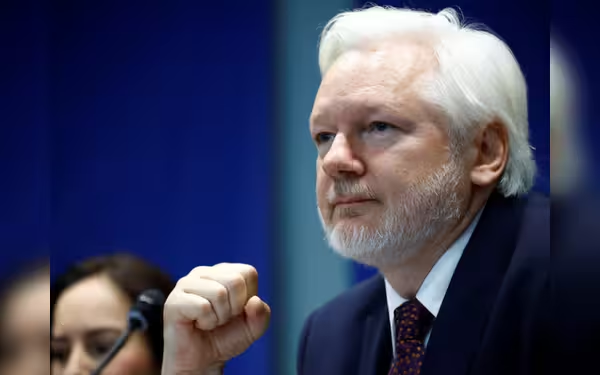Saturday, October 5, 2024 10:31 PM
Julian Assange's First Address After Release from British Custody
- Assange chose freedom over justice in his recent address.
- He reflects on his lengthy legal battles in the UK.
- His case raises questions about whistleblower protections.
 Image Credits: tribune.com.pk
Image Credits: tribune.com.pkJulian Assange reflects on choosing freedom over justice in his first address after release from British custody.
Julian Assange, the founder of WikiLeaks, has been a controversial figure in the world of journalism and whistleblowing. His organization is known for publishing classified information, which has sparked debates about freedom of speech, government transparency, and national security. After spending years in legal battles and facing serious charges in the United States, Assange recently made headlines again with his first address after being released from British custody.
On Tuesday, Assange addressed European lawmakers, reflecting on his decision to plead guilty to US espionage charges. He stated that this choice was necessary, as his previous legal and political efforts to secure his freedom had not been enough. At 53 years old, Assange returned to his home country of Australia in June, following a deal that allowed him to plead guilty to violating US espionage law. This marked the end of a lengthy 14-year legal journey in the UK.
During his address, Assange emphasized the difficult position he found himself in, where he had to choose between "freedom over justice." This statement resonates with many who have followed his case, as it highlights the complex nature of legal systems and the often harsh realities faced by whistleblowers. Assange's situation raises important questions about the balance between protecting national security and upholding the rights of individuals who expose wrongdoing.
As Assange continues to navigate his new life in Australia, his reflections serve as a reminder of the ongoing struggles faced by those who dare to challenge powerful institutions. His story is not just about one man’s fight for freedom; it is about the broader implications for journalism, transparency, and the rights of individuals in a democratic society. The conversation surrounding Assange's actions and their consequences will likely continue, prompting further discussions about the role of whistleblowers in our world.
Julian Assange's journey is a complex tale of courage, sacrifice, and the quest for truth. As we reflect on his experiences, it is essential to consider the implications for future whistleblowers and the importance of protecting those who seek to bring light to dark corners of power. The dialogue surrounding freedom, justice, and accountability remains crucial in our ever-evolving society.













